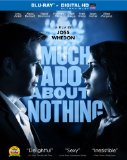| Reviews & Columns |
|
Reviews DVD TV on DVD Blu-ray 4K UHD International DVDs In Theaters Reviews by Studio Video Games Features Collector Series DVDs Easter Egg Database Interviews DVD Talk Radio Feature Articles Columns Anime Talk DVD Savant Horror DVDs The M.O.D. Squad Art House HD Talk Silent DVD
|
DVD Talk Forum |
|
|
| Resources |
|
DVD Price Search Customer Service #'s RCE Info Links |
|
Columns
|
|
|
Much Ado About Nothing (2012)
Lionsgate Home Entertainment // PG-13 // October 8, 2013
List Price: $24.99 [Buy now and save at Amazon]
The Film:
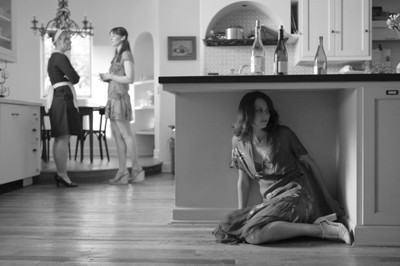 Leave it to Joss Whedon to concoct something new during his vacation time. Instead of taking a presumably much-needed break after production for The Avengers, the mastermind behind several television series and big-budget films -- ones that typically appear on a modern sci-fi geek's tops list -- decided to pencil in something far smaller in scale and budget to fill the time: a pennies-to-the-dollar adaptation of a play by William Shakespeare, shot on the grounds of his Santa Monica home with little warning or fanfare. Over the course of about two weeks, Whedon pulled together a reunion of sorts from the many branches of his 'verse for a monochrome rendition of "Much Ado About Nothing", one of the playwright's overt comedies with a cynical outlook on the politics of trust and relationships. The result is irresistibly charming, a work of passion whose enthusiasm for Shakespearean theatricality and the actors involved manifests into a stylish, saucy, and untainted recontextualization of the material.
Leave it to Joss Whedon to concoct something new during his vacation time. Instead of taking a presumably much-needed break after production for The Avengers, the mastermind behind several television series and big-budget films -- ones that typically appear on a modern sci-fi geek's tops list -- decided to pencil in something far smaller in scale and budget to fill the time: a pennies-to-the-dollar adaptation of a play by William Shakespeare, shot on the grounds of his Santa Monica home with little warning or fanfare. Over the course of about two weeks, Whedon pulled together a reunion of sorts from the many branches of his 'verse for a monochrome rendition of "Much Ado About Nothing", one of the playwright's overt comedies with a cynical outlook on the politics of trust and relationships. The result is irresistibly charming, a work of passion whose enthusiasm for Shakespearean theatricality and the actors involved manifests into a stylish, saucy, and untainted recontextualization of the material.
Avoiding the nuisance of dressing his actors in tunics and long dresses, Whedon places Much Ado About Nothing in a modern setting, happening in and around the extravagant home of Leonato (Clark Gregg), a wealthy businessman/governor. There, among friends, family, and questionable acquaintances, dressed in sharp clothes and navigating through the ritzy manor, a war of words brews between ex-lovers Beatrice (Amy Acker), Leonato's neice, and Benedick (Alexis Denisof), the companion of a visiting prince, Don Pedro (Reed Diamond). A romance blossoms in their midst: Claudio (Fran Kranz), another of the prince's companions, discovers an unrelenting draw to the daughter of Leonato, Hero (Jillian Morgese), leading to bashful shenanigans that point towards plans -- and schemes -- to their betrothal. Things go awry in the presence of the villainous Don John (Sean Maher), the brother of Don Pedro, who would like nothing more than to thwart their romance before it gets started. But the Hero-Claudio romantic link won't be the only one to flourish in Leonato's manor, if other guests and residents have a say in the matter.
Much Ado About Nothing sticks closely to the original play, which can be both delightful and a bit perplexing in this new context. Enthusiasts of Shakespeare's work should relish the authentic dramatics and tempo of the dialogue, fleshing out his plot of deception, adoration, and conflicted people discovering the line between hate and affection, which effortlessly flows through Leonato's quaint but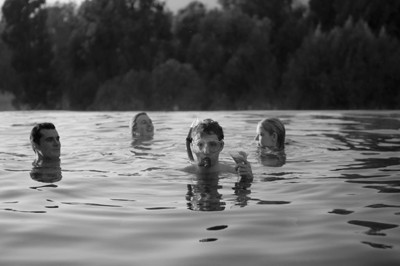 lavish home. Looking closer, the Renaissance pomp and circumstance from the text occasionally betrays the updated modern setting and Jay Hunter's chic black-and-white cinematography, interchanging between odes to the French New Wave and reminding one of a Calvin Klein advertisement. Developments around marriage and the trickle of information about rumored deaths and police matters clash with the contemporary period, along with some of the humor and societal references; yet, it doesn't really matter when the direction allows the comedy's zeal and charisma to so robustly command its tone.
lavish home. Looking closer, the Renaissance pomp and circumstance from the text occasionally betrays the updated modern setting and Jay Hunter's chic black-and-white cinematography, interchanging between odes to the French New Wave and reminding one of a Calvin Klein advertisement. Developments around marriage and the trickle of information about rumored deaths and police matters clash with the contemporary period, along with some of the humor and societal references; yet, it doesn't really matter when the direction allows the comedy's zeal and charisma to so robustly command its tone.
The fingerprints left by Whedon's direction can be spotted in the effortless conversation style achieved with Shakespeare's banter, as well as a more updated look at how the various relationships are formed and fleshed out. Little details, like focusing on Benedick and Beatrice's observable romantic past at the beginning as a spark to their spite, go a long way in grounding the works' broad theatrical nature. Much Ado About Nothing's vibrant inclinations mesh exceptionally well with Whedon's ability to squeeze humor into solemn scenarios, too, once the story moves into slightly darker territory that burdens nearly all the characters. The biggest compliment somebody can probably pay to a literal reinterpretation of Shakespeare's material in the modern era is that the dialogue fits and feels more naturally than expected, and that regularly happens during the dining room talks, the lavish parties, and the cloak-and-dagger scheming that takes place around Leonato's abode.
Whedon's gallery of actors play a major part in masking the gap between contemporary styling and Shakespearean dramaturgy, where the diverse personalities of Joss Whedon's other creations gather into a cornucopia of intriguing usage of their talents, often against type. Dollhouse's Amy Acker and Angel's Alexis Denisof capably harness the mesmerizing "hatemance" between Beatrice and Benedick, driven by their palpable charisma and quick wits as they bitterly trade barbs. The energy from their chemistry gracefully powers the central attraction to Much Ado About Nothing -- complimented by the familiar faces of Reed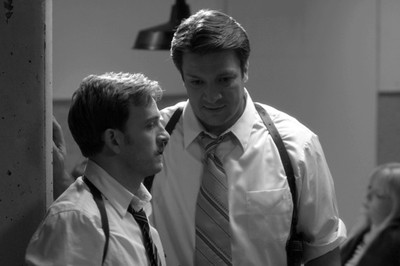 Diamond, Clark Gregg, and Ashley Johnson as the tack-sharp royalty and housemaids provoking their connection -- where the swift and passionate wordplay never overpowers their personality and poise. While our villain Don John comes to life through attention-grabbing sternness from Firefly's Sean Maher, the bigger surprise pops up in the referential police-drama tone that Nathan Fillion and Tom Lenk nail as comic-relief detectives Dogburry and Verges, mixing in a little Castle and Law & Order with the bard's work.
Diamond, Clark Gregg, and Ashley Johnson as the tack-sharp royalty and housemaids provoking their connection -- where the swift and passionate wordplay never overpowers their personality and poise. While our villain Don John comes to life through attention-grabbing sternness from Firefly's Sean Maher, the bigger surprise pops up in the referential police-drama tone that Nathan Fillion and Tom Lenk nail as comic-relief detectives Dogburry and Verges, mixing in a little Castle and Law & Order with the bard's work.
More than anything, Much Ado About Nothing conveys the spirit of crafting something explicitly for the joy in doing so: an unceremonious partial reunion of the Whedonverse for the purpose of acting out Shakespeare, which so happens to have been filmed, cut, and released for others to see. There's a degree of both intimacy and willing dedication that courses through the film's veins because of this purity, something that can get lost in more lavish theatrical productions of the bard's work. Whedon isn't out to dazzle with clever visuals, though shots of dancers suspended from trees and Benedick pacing up and down shadowy stairs are eye-grabbing; there's a costume ball that looks terrific in black and white. Nor is he out to overwhelm with extravagant dramatic displays, though moments like a defiant, desperate speech in Amy Acker's portrayal do emerge. Instead, it's about the simple, enthusiastic charm that comes from absorbing the home-brewed product of Joss Whedon's take on the great playwright, and it goes down very, very smoothly.
The Blu-ray:
Much Ado About Nothing enters stage right on Blu-ray in typical fashion from Lionsgate, contained within a standard eco-friendly blue case and sporting a silver-topped disc. A cardboard slipcase has been included with early pressings, as well as a promo leaflet for the film that also includes a Digital Copy code.
Video and Audio:
Contemporary black-and-white films are fairly infrequent on Blu-ray, of course, so it's always a treat to see how modern grayscale cinematography appears in HD. Here, the delights in Much Ado About Nothing come in observing the shadows and textures captured in the somewhat domestic environment of Whedon's Santa Monica mini-mansion, which comes together into a serviceable, occasionally quite beautiful 1.78:1-framed 1080p AVC transfer that nimbly handles its fluctuating black levels. Small accouterments, such as the sheen on a leather jacket and the ornate detail in a carnival mask, reveal a keen grasp on fine detail where needed, while close-ups offer the bulk of impressive depth and clarity in the actors' skin and facial hair. It's not perfect: contrast can be a bit imbalanced and light-gray in a few points, while other sequences simply can't fight beyond the digital photography's detail limitations. By and large, though, it's a successful, engaging monochrome experience.
Much Ado About Nothing sports a serviceable 5.1 Master Audio track, a convincingly clear and stable presentation of modern, low-budget, front-positioned aural design that does little to test its fidelity. Naturally, it's all about preservation of dialogue and its ability to keep the quick Shakespearean lingo audible, which the track mostly nails; some lines of dialogue end up a little muffled and require concentration to discern what's being said, but it can be done with marginal issue. Atmospheric music occasionally muscles into the track and sounds robust enough for its purposes without being memorably potent, while a few faint sound effects -- the splashing of water, a goofy slap fight, etc. -- offer enough of a punch to get the job done. No distortion and only a few instances of tough-to-hear dialogue make it a decent, fitting treatment. English, SDH, and Spanish subtitles are available, along with a 5.1 Spanish Dolby Digital track.
Special Features:
Surprisingly, Much Ado About Nothing comes equipped with two (!) Commentaries, both featuring Joss Whedon. The first is a Solo Commentary with the director where he reaches into the production and conceptualization process, from giving us some background on his experience with casual Shakespearean readings with his friends, to how making this film was a bit of a "homecoming" after production on The Avengers. The way he interacts with the film playing is one of a relaxed but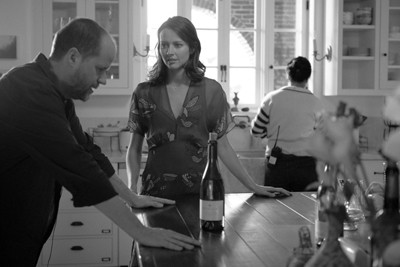 gripping storyteller, where he interjects details -- about actors, interpretations, orchestrating scenes, happy accidents, and going too far or not far enough in tone -- in between his own running narrative about the overarching creative process. The other Cast Commentary is a scattered, casual romp with enough cast members that it takes three minutes to get through the introductions, where they nonchalantly hit on details about performances and production as they spot 'em during the movie once they get fired up. I bet it'll be one of the few times you'll ever hear the term "Shakespearean Motor-boating".
gripping storyteller, where he interjects details -- about actors, interpretations, orchestrating scenes, happy accidents, and going too far or not far enough in tone -- in between his own running narrative about the overarching creative process. The other Cast Commentary is a scattered, casual romp with enough cast members that it takes three minutes to get through the introductions, where they nonchalantly hit on details about performances and production as they spot 'em during the movie once they get fired up. I bet it'll be one of the few times you'll ever hear the term "Shakespearean Motor-boating".
After plowing through the commentaries, there are a few other tidbits to dig into on the disc, paramount being the Much Ado About Making Nothing (22:12, HD) featurette that gets all of the actors and crew in front of the camera for interviews in a not-so-standard "making of" piece. It starts with Joss Whedon chronicling the origin of his Shakespeare reading parties, which then leads into discussions about how the actors got involved (most said yes before Joss even finished asking), the reasons Joss and his producer/wife Kai Cole built the house to accommodate to a play atmosphere, shooting in black and white, and a bit about screening the film and Joss' link with his actors and fans. Each actor and crew member offers a little extra piece to the puzzle that paints a pretty strong picture of the camaraderie and focus while creating the film. There's also the Bus Ado About Nothing (6:09, HD) feature that focuses on the cross-country tour Joss and some of his actors took to bring the film to Austin's SXSW festival, as well as a "Sign No More" Music Video (2:43, HD), the film's title track.
Final Thoughts:
Whedon does Shakespeare on a shoestring budget, and it's about as much fun as you'd expect. Shot in less than two weeks on a rigorous but jubilant schedule with the director's troupe of familiar actors, Joss Whedon's Much Ado About Nothing takes the playwright's easily-recognizable dialogue structure and drops it in the current era, telling its darkly-comedic story of trust, adoration, and the positives and negatives of meddling with affairs in a refreshingly from-the-hip fashion. Backed up by reputable performances and a stripped-down yet alluring black-and-white aesthetic that gives it a stylish edge, Joss Whedon's small-scale project -- taking up time between production stretches for his big-budget comic movie -- ends up being a splendid indie endeavor and a slick, reverent perspective on one of Shakespeare's plays that hasn't been done to death (yet). Lionsgate's Blu-ray presents the film with suitable HD strength considering its digital roots, as well as a pair of commentaries and a delightful making-of piece. Highly Recommended.
Thomas Spurlin, Staff Reviewer -- DVDTalk Reviews | Personal Blog/Site
 Leave it to Joss Whedon to concoct something new during his vacation time. Instead of taking a presumably much-needed break after production for The Avengers, the mastermind behind several television series and big-budget films -- ones that typically appear on a modern sci-fi geek's tops list -- decided to pencil in something far smaller in scale and budget to fill the time: a pennies-to-the-dollar adaptation of a play by William Shakespeare, shot on the grounds of his Santa Monica home with little warning or fanfare. Over the course of about two weeks, Whedon pulled together a reunion of sorts from the many branches of his 'verse for a monochrome rendition of "Much Ado About Nothing", one of the playwright's overt comedies with a cynical outlook on the politics of trust and relationships. The result is irresistibly charming, a work of passion whose enthusiasm for Shakespearean theatricality and the actors involved manifests into a stylish, saucy, and untainted recontextualization of the material.
Leave it to Joss Whedon to concoct something new during his vacation time. Instead of taking a presumably much-needed break after production for The Avengers, the mastermind behind several television series and big-budget films -- ones that typically appear on a modern sci-fi geek's tops list -- decided to pencil in something far smaller in scale and budget to fill the time: a pennies-to-the-dollar adaptation of a play by William Shakespeare, shot on the grounds of his Santa Monica home with little warning or fanfare. Over the course of about two weeks, Whedon pulled together a reunion of sorts from the many branches of his 'verse for a monochrome rendition of "Much Ado About Nothing", one of the playwright's overt comedies with a cynical outlook on the politics of trust and relationships. The result is irresistibly charming, a work of passion whose enthusiasm for Shakespearean theatricality and the actors involved manifests into a stylish, saucy, and untainted recontextualization of the material. Avoiding the nuisance of dressing his actors in tunics and long dresses, Whedon places Much Ado About Nothing in a modern setting, happening in and around the extravagant home of Leonato (Clark Gregg), a wealthy businessman/governor. There, among friends, family, and questionable acquaintances, dressed in sharp clothes and navigating through the ritzy manor, a war of words brews between ex-lovers Beatrice (Amy Acker), Leonato's neice, and Benedick (Alexis Denisof), the companion of a visiting prince, Don Pedro (Reed Diamond). A romance blossoms in their midst: Claudio (Fran Kranz), another of the prince's companions, discovers an unrelenting draw to the daughter of Leonato, Hero (Jillian Morgese), leading to bashful shenanigans that point towards plans -- and schemes -- to their betrothal. Things go awry in the presence of the villainous Don John (Sean Maher), the brother of Don Pedro, who would like nothing more than to thwart their romance before it gets started. But the Hero-Claudio romantic link won't be the only one to flourish in Leonato's manor, if other guests and residents have a say in the matter.
Much Ado About Nothing sticks closely to the original play, which can be both delightful and a bit perplexing in this new context. Enthusiasts of Shakespeare's work should relish the authentic dramatics and tempo of the dialogue, fleshing out his plot of deception, adoration, and conflicted people discovering the line between hate and affection, which effortlessly flows through Leonato's quaint but
 lavish home. Looking closer, the Renaissance pomp and circumstance from the text occasionally betrays the updated modern setting and Jay Hunter's chic black-and-white cinematography, interchanging between odes to the French New Wave and reminding one of a Calvin Klein advertisement. Developments around marriage and the trickle of information about rumored deaths and police matters clash with the contemporary period, along with some of the humor and societal references; yet, it doesn't really matter when the direction allows the comedy's zeal and charisma to so robustly command its tone.
lavish home. Looking closer, the Renaissance pomp and circumstance from the text occasionally betrays the updated modern setting and Jay Hunter's chic black-and-white cinematography, interchanging between odes to the French New Wave and reminding one of a Calvin Klein advertisement. Developments around marriage and the trickle of information about rumored deaths and police matters clash with the contemporary period, along with some of the humor and societal references; yet, it doesn't really matter when the direction allows the comedy's zeal and charisma to so robustly command its tone. The fingerprints left by Whedon's direction can be spotted in the effortless conversation style achieved with Shakespeare's banter, as well as a more updated look at how the various relationships are formed and fleshed out. Little details, like focusing on Benedick and Beatrice's observable romantic past at the beginning as a spark to their spite, go a long way in grounding the works' broad theatrical nature. Much Ado About Nothing's vibrant inclinations mesh exceptionally well with Whedon's ability to squeeze humor into solemn scenarios, too, once the story moves into slightly darker territory that burdens nearly all the characters. The biggest compliment somebody can probably pay to a literal reinterpretation of Shakespeare's material in the modern era is that the dialogue fits and feels more naturally than expected, and that regularly happens during the dining room talks, the lavish parties, and the cloak-and-dagger scheming that takes place around Leonato's abode.
Whedon's gallery of actors play a major part in masking the gap between contemporary styling and Shakespearean dramaturgy, where the diverse personalities of Joss Whedon's other creations gather into a cornucopia of intriguing usage of their talents, often against type. Dollhouse's Amy Acker and Angel's Alexis Denisof capably harness the mesmerizing "hatemance" between Beatrice and Benedick, driven by their palpable charisma and quick wits as they bitterly trade barbs. The energy from their chemistry gracefully powers the central attraction to Much Ado About Nothing -- complimented by the familiar faces of Reed
 Diamond, Clark Gregg, and Ashley Johnson as the tack-sharp royalty and housemaids provoking their connection -- where the swift and passionate wordplay never overpowers their personality and poise. While our villain Don John comes to life through attention-grabbing sternness from Firefly's Sean Maher, the bigger surprise pops up in the referential police-drama tone that Nathan Fillion and Tom Lenk nail as comic-relief detectives Dogburry and Verges, mixing in a little Castle and Law & Order with the bard's work.
Diamond, Clark Gregg, and Ashley Johnson as the tack-sharp royalty and housemaids provoking their connection -- where the swift and passionate wordplay never overpowers their personality and poise. While our villain Don John comes to life through attention-grabbing sternness from Firefly's Sean Maher, the bigger surprise pops up in the referential police-drama tone that Nathan Fillion and Tom Lenk nail as comic-relief detectives Dogburry and Verges, mixing in a little Castle and Law & Order with the bard's work. More than anything, Much Ado About Nothing conveys the spirit of crafting something explicitly for the joy in doing so: an unceremonious partial reunion of the Whedonverse for the purpose of acting out Shakespeare, which so happens to have been filmed, cut, and released for others to see. There's a degree of both intimacy and willing dedication that courses through the film's veins because of this purity, something that can get lost in more lavish theatrical productions of the bard's work. Whedon isn't out to dazzle with clever visuals, though shots of dancers suspended from trees and Benedick pacing up and down shadowy stairs are eye-grabbing; there's a costume ball that looks terrific in black and white. Nor is he out to overwhelm with extravagant dramatic displays, though moments like a defiant, desperate speech in Amy Acker's portrayal do emerge. Instead, it's about the simple, enthusiastic charm that comes from absorbing the home-brewed product of Joss Whedon's take on the great playwright, and it goes down very, very smoothly.
The Blu-ray:
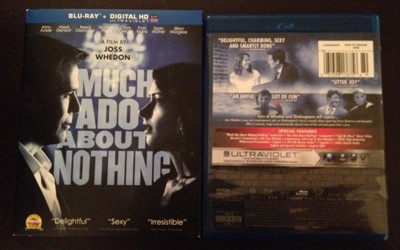 | 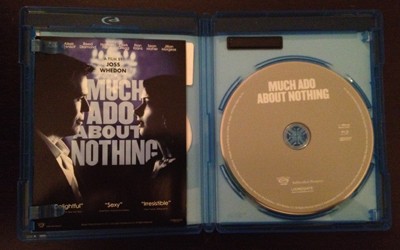 |
Much Ado About Nothing enters stage right on Blu-ray in typical fashion from Lionsgate, contained within a standard eco-friendly blue case and sporting a silver-topped disc. A cardboard slipcase has been included with early pressings, as well as a promo leaflet for the film that also includes a Digital Copy code.
Video and Audio:
Contemporary black-and-white films are fairly infrequent on Blu-ray, of course, so it's always a treat to see how modern grayscale cinematography appears in HD. Here, the delights in Much Ado About Nothing come in observing the shadows and textures captured in the somewhat domestic environment of Whedon's Santa Monica mini-mansion, which comes together into a serviceable, occasionally quite beautiful 1.78:1-framed 1080p AVC transfer that nimbly handles its fluctuating black levels. Small accouterments, such as the sheen on a leather jacket and the ornate detail in a carnival mask, reveal a keen grasp on fine detail where needed, while close-ups offer the bulk of impressive depth and clarity in the actors' skin and facial hair. It's not perfect: contrast can be a bit imbalanced and light-gray in a few points, while other sequences simply can't fight beyond the digital photography's detail limitations. By and large, though, it's a successful, engaging monochrome experience.
Much Ado About Nothing sports a serviceable 5.1 Master Audio track, a convincingly clear and stable presentation of modern, low-budget, front-positioned aural design that does little to test its fidelity. Naturally, it's all about preservation of dialogue and its ability to keep the quick Shakespearean lingo audible, which the track mostly nails; some lines of dialogue end up a little muffled and require concentration to discern what's being said, but it can be done with marginal issue. Atmospheric music occasionally muscles into the track and sounds robust enough for its purposes without being memorably potent, while a few faint sound effects -- the splashing of water, a goofy slap fight, etc. -- offer enough of a punch to get the job done. No distortion and only a few instances of tough-to-hear dialogue make it a decent, fitting treatment. English, SDH, and Spanish subtitles are available, along with a 5.1 Spanish Dolby Digital track.
Special Features:
Surprisingly, Much Ado About Nothing comes equipped with two (!) Commentaries, both featuring Joss Whedon. The first is a Solo Commentary with the director where he reaches into the production and conceptualization process, from giving us some background on his experience with casual Shakespearean readings with his friends, to how making this film was a bit of a "homecoming" after production on The Avengers. The way he interacts with the film playing is one of a relaxed but
 gripping storyteller, where he interjects details -- about actors, interpretations, orchestrating scenes, happy accidents, and going too far or not far enough in tone -- in between his own running narrative about the overarching creative process. The other Cast Commentary is a scattered, casual romp with enough cast members that it takes three minutes to get through the introductions, where they nonchalantly hit on details about performances and production as they spot 'em during the movie once they get fired up. I bet it'll be one of the few times you'll ever hear the term "Shakespearean Motor-boating".
gripping storyteller, where he interjects details -- about actors, interpretations, orchestrating scenes, happy accidents, and going too far or not far enough in tone -- in between his own running narrative about the overarching creative process. The other Cast Commentary is a scattered, casual romp with enough cast members that it takes three minutes to get through the introductions, where they nonchalantly hit on details about performances and production as they spot 'em during the movie once they get fired up. I bet it'll be one of the few times you'll ever hear the term "Shakespearean Motor-boating". After plowing through the commentaries, there are a few other tidbits to dig into on the disc, paramount being the Much Ado About Making Nothing (22:12, HD) featurette that gets all of the actors and crew in front of the camera for interviews in a not-so-standard "making of" piece. It starts with Joss Whedon chronicling the origin of his Shakespeare reading parties, which then leads into discussions about how the actors got involved (most said yes before Joss even finished asking), the reasons Joss and his producer/wife Kai Cole built the house to accommodate to a play atmosphere, shooting in black and white, and a bit about screening the film and Joss' link with his actors and fans. Each actor and crew member offers a little extra piece to the puzzle that paints a pretty strong picture of the camaraderie and focus while creating the film. There's also the Bus Ado About Nothing (6:09, HD) feature that focuses on the cross-country tour Joss and some of his actors took to bring the film to Austin's SXSW festival, as well as a "Sign No More" Music Video (2:43, HD), the film's title track.
Final Thoughts:
Whedon does Shakespeare on a shoestring budget, and it's about as much fun as you'd expect. Shot in less than two weeks on a rigorous but jubilant schedule with the director's troupe of familiar actors, Joss Whedon's Much Ado About Nothing takes the playwright's easily-recognizable dialogue structure and drops it in the current era, telling its darkly-comedic story of trust, adoration, and the positives and negatives of meddling with affairs in a refreshingly from-the-hip fashion. Backed up by reputable performances and a stripped-down yet alluring black-and-white aesthetic that gives it a stylish edge, Joss Whedon's small-scale project -- taking up time between production stretches for his big-budget comic movie -- ends up being a splendid indie endeavor and a slick, reverent perspective on one of Shakespeare's plays that hasn't been done to death (yet). Lionsgate's Blu-ray presents the film with suitable HD strength considering its digital roots, as well as a pair of commentaries and a delightful making-of piece. Highly Recommended.
|
| Popular Reviews |
| Sponsored Links |
|
|
| Sponsored Links |
|
|
| Release List | Reviews | Shop | Newsletter | Forum | DVD Giveaways | Blu-Ray | Advertise |
|
Copyright 2024 DVDTalk.com All Rights Reserved. Legal Info, Privacy Policy, Terms of Use,
Manage Preferences,
Your Privacy Choices | |||||||









